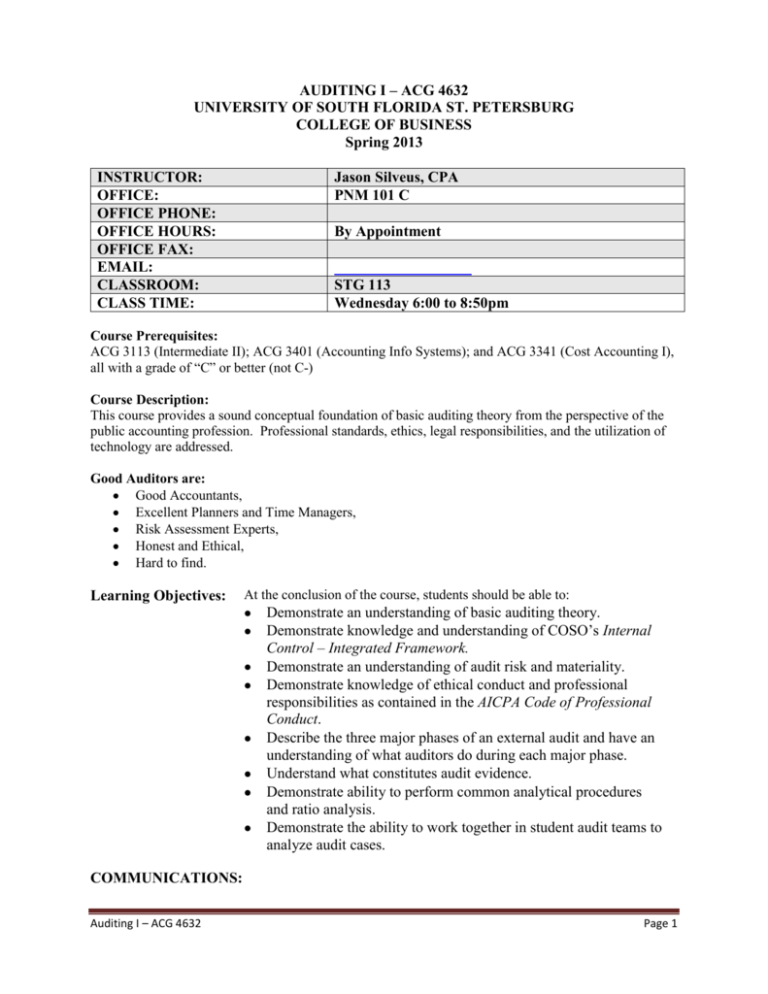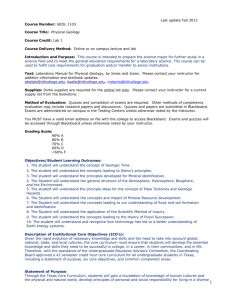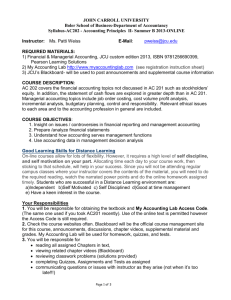
AUDITING I – ACG 4632
UNIVERSITY OF SOUTH FLORIDA ST. PETERSBURG
COLLEGE OF BUSINESS
Spring 2013
INSTRUCTOR:
OFFICE:
OFFICE PHONE:
OFFICE HOURS:
OFFICE FAX:
EMAIL:
CLASSROOM:
CLASS TIME:
Jason Silveus, CPA
PNM 101 C
By Appointment
STG 113
Wednesday 6:00 to 8:50pm
Course Prerequisites:
ACG 3113 (Intermediate II); ACG 3401 (Accounting Info Systems); and ACG 3341 (Cost Accounting I),
all with a grade of “C” or better (not C-)
Course Description:
This course provides a sound conceptual foundation of basic auditing theory from the perspective of the
public accounting profession. Professional standards, ethics, legal responsibilities, and the utilization of
technology are addressed.
Good Auditors are:
Good Accountants,
Excellent Planners and Time Managers,
Risk Assessment Experts,
Honest and Ethical,
Hard to find.
Learning Objectives:
At the conclusion of the course, students should be able to:
Demonstrate an understanding of basic auditing theory.
Demonstrate knowledge and understanding of COSO’s Internal
Control – Integrated Framework.
Demonstrate an understanding of audit risk and materiality.
Demonstrate knowledge of ethical conduct and professional
responsibilities as contained in the AICPA Code of Professional
Conduct.
Describe the three major phases of an external audit and have an
understanding of what auditors do during each major phase.
Understand what constitutes audit evidence.
Demonstrate ability to perform common analytical procedures
and ratio analysis.
Demonstrate the ability to work together in student audit teams to
analyze audit cases.
COMMUNICATIONS:
Auditing I – ACG 4632
Page 1
I am always happy to help you and welcome your questions before, during, or after class. Office hours are
by appointment only; however, I will post specific office hour times after examinations and before the
due date of your team case project.
Email is the best way to contact me.
REQUIRED TEXTS & RESOURCES:
1. Auditing and Assurance Services: An Integrated Approach (14th edition)
Authors: Arens, Elder, and Beasley
Publisher: Pearson Prentice-Hall, Inc.
Two formats available:
a. Student Value Edition,
ISBN 13:
978-013-257596-6
b. Coursesmart eTextbook, 14/E
ISBN 13:
978-013-257597-3
TOPICAL COVERAGE:
Introduction to Auditing
Auditing Standards and Audit Reports
Professional Ethics and Legal Liability
Audit Responsibilities and Objectives
Audit Evidence
Auditing Planning
Analytical procedures
Materiality and Risk
Internal Control
Auditing Cycles
Approx Percentage
5%
10%
10%
10%
10%
10%
10%
10%
10%
15%
100%
STUDENT EVALUATION BY INSTRUCTOR:
Exam 1
Exam 2
Exam 3
Audit Case Assignment
In Class Assignments & Quizzes
Points
110
130
110
80
70
500
Percentage
22%
26%
22%
16%
14%
100%
COURSE GRADING:
Letter Grade
Point Spread
Percentage
A
450 – 500
90% and >
B
400 – 449
80% to 89.9%
C
350 – 399
70% to 79.9%
D
300 – 349
60% to 69.9%
F
below 300
< 60%
Note 1: Plus and minus grades are not given in this course.
Note 2: No extra credit is available in this course.
Note 3: No quiz makeups are allowed for any reason. You must be in the classroom when quizzes are
given.
Auditing I – ACG 4632
Page 2
EXAMS:
Students are expected to attend all exams. You must discuss any reason for missing an exam with the
instructor in advance of the exam. Make-up exams, if allowed, will be taken at the convenience of the
instructor within one week of the scheduled exam. Failure to take an exam without the instructor’s prior
approval will result in a grade of zero points for the exam. The instructor reserves the right to require
documentation to substantiate the reason for not taking any exam at the regularly scheduled time.
Exams usually consist of multiple-choice questions, but may also contain True/False, or short answer
questions.
Topical coverage will be announced prior to each exam and students are responsible for any information:
Presented in class (via your instructor, news articles, videos, outside professional speakers, or
student presentations, etc.),
Distributed or available on Blackboard,
Contained in any assigned chapters,
Contained in any quiz or prior exam,
Covered by any homework assignment,
Homework questions contained at the end of every chapter covered,
Sample questions contained at the end of Power Point slides presented in class or posted on
Blackboard,
Sample test questions provided on Blackboard.
Requests to re-grade an exam will be honored only if the request is received within one week of the date
the exam is returned and reviewed. After in-class review, all exams will be collected by the instructor.
No re-grade requests will be honored if received after this time limit. Except in the case of footing errors,
the entire exam will be re-graded. (This means that your grade could go down as well as up.) All exam
papers will be destroyed two (2) weeks after the end of the semester.
QUIZZES:
Quizzes and in class assignments may be given at the discretion of the instructor. Sufficient notice will
be given for quizzes and assignments requiring preparation.
Note: No quiz makeups are allowed for any reason. You must be in the classroom when quizzes are
given or you may not take the quiz. Please prepare for class by reading the text book chapters
assigned.
AUDIT CASE:
Description of the audit case will be posted to blackboard.
HOMEWORK:
At the end of every chapter there are many opportunities for students to self-test their knowledge of the
chapter by reviewing specific terminology and completing exercises and problems.
Students are responsible for all
Essential Terms,
Review Questions
Multiple Choice Questions at end of chapters.
Solutions are provided on Blackboard. Additional suggested homework assignments are
included in the course schedule. Class time may be used to cover chapter exercises and problems
that the instructor wishes to highlight. Homework will not be collected, except for Audit Case
assignments.
Auditing I – ACG 4632
Page 3
COURSE POLICIES:
COURSE PREPARATION:
The material in this class is appropriately difficult for an upper-level 4th- or 5th- year accounting course.
As such, students will understand the lectures much better by being well prepared for each class. This
means that
(1) You have read the relevant materials assigned, and
(2) You have re-read the relevant materials assigned.
Educational research has shown that student participation leads to more active learning and higher
retention of material. Students should be prepared to discuss all case assignments in class.
COURSE SCHEDULE:
The course schedule is to be considered a “working document.” This means that there may be
changes made for various reasons during the course of the semester. Your instructor will make
every effort to be guided by the dates provided in the course schedule. Students are asked to
understand that there are times when schedule changes are made in the best interests of the
students (e.g., weather issues, traffic issues, problems regarding availability of class resources, or
mental lapses of the instructor).
BLACKBOARD:
Students are responsible for checking Blackboard on a regular basis, and at least just prior to each class,
for information regarding assignments, quizzes, exams, or any changes made to the course schedule by
your instructor.
CALCULATORS:
Calculators may be used on all exams or quizzes, however no calculators that are able to store
text will be allowed for exams.
Students are expected to act as professional auditors who are prepared to make quick calculations
at any time. Therefore, students should bring calculators with them to every class even though
calculations may not be required for each class.
ATTENDANCE & CLASSROOM BEHAVIOR:
Timely attendance is expected of all students for all classes and necessary for the successful
completion of this course; however, roll will not be taken(With the exception of the Executive
Forum on October 23rd).
Students are expected to act in a professional manner at all times.
If you must arrive late, please enter the room quietly and do not disrupt the class in progress.
RELEASE OF GRADES:
Instructors are not permitted to release any grades or exam scores over the telephone or by email. Your
exam scores and final letter grade will be posted to Blackboard unless there is a problem with the
university Blackboard grading system. Please access them there. Please notify the instructor if you have
any problems accessing grades in Blackboard.
Auditing I – ACG 4632
Page 4
KEY LEADERSHIP SKILL(S) AND PERSPECTIVES ADDRESSED IN THIS COURSE:
Interpersonal and
Communication
Skills
Analytical and Critical
Thinking Skills
Information
Technology
Skills
5(a)
5 (b)
3 (c)
Reflective
Thinking and
Experiential
Learning
3(d)
Ethical and Social
Consciousness
Multicultural
Competence
3 (e)
2 (f)
(a) Through in-class discussions, homework discussions, in-class exercises, and audit case analysis.
(b) Auditing is a theoretical accounting course that involves constant analytical and critical thinking
skills; these sill are used throughout the course.
(c) Audit case analyses require the use of spreadsheet software. Additionally, students must present data
and conclusions in a meaningful manner using Word and Excel.
(d) Reflective thinking is emphasized throughout the course as students analyze and summarize auditing
standards in two written assignments. Reflective thinking is also a large part of real-world audit case
analysis as students prepare for in-class discussions of cases and prepare written responses to specific
questions related to these audit cases.
(e) The course lectures and homework emphasize ethical decisions in today's business world. In addition
there is an entire chapter devoted to Professional Ethics.
(f) References and discussion throughout the course to the global business environment and international
accounting and auditing standards.
UNIVERSITY & COLLEGE POLICY
HONOR SYSTEM: Under the USF Honor System, each student is expected to observe complete honesty in all
academic matters. Violation of the Honor System will be referred to the Honor Council. Note: The
following are violations of the Honor Code: Copying another student’s homework, signing another student’s
name on the attendance roster, copying another group’s disk or written work, using another student’s
computer disk to print out your assignment, copying another student’s file onto your disk, and
misrepresenting a reason for a missed exam. Plagiarism or cheating on course work or on examinations will
result in penalties that may include a grade of “F” for the specific exam or course work and a grade of “F” or
“FF” for the course. Any incident of academic dishonesty will be reported to the Dean of the College.
Definitions and punishment guidelines for Plagiarism, Cheating, and Student Disruption of the Academic
Process may be found in the USF Policy on Academic Dishonesty & Disruption of the Academic Process at
http://www.stpt.usf.edu/ugc/documents/USFSPUNDERGRADCATALOG.pdf
STUDENTS WITH DISABILITIES: Please notify your instructor by the second class meeting if you have a
learning disability or require special assistance with this course. Confidential personal and learning
assistance counseling are made available to students through the Division of Student Affairs. Contact R.
Barry McDowell, St. Petersburg Campus: TER 200 (727) 873-4940, (mcdowell@stpt.usf.edu) for more
information.
RELIGIOUS OBSERVANCES: Students who anticipate the necessity of being absent from class due to the
observance of a major religious holiday must provide notice of the date(s) to the instructor, in writing, by the
second class meeting.
COPYRIGHTS: Students who wish to audiotape lectures can do so with direct permission from the
professor, but tapes and lectures may not be sold. No videos or photos can be taken in the classroom!
INCOMPLETE GRADES: An “I” grade may be given to an undergraduate student only when a small
portion of the student’s work (normally 30% or less) is incomplete due to circumstances beyond the
control of the student and only when a student is otherwise earning a passing grade. “I” grades are to be
Auditing I – ACG 4632
Page 5
used only in emergency situations and cannot to be used as a means of avoiding a poor grade. Normally
these are only for medical emergencies and require a signed letter from a medical professional that the
student was prevented from attending class. The student must petition the professor before the week of
final exams for a grade of “I” to be given.
GRADE FORGIVENESS: Grade forgiveness is limited to three USFSP courses with no more than one repeat
per course. Accounting majors can use the forgiveness only once in upper level accounting courses.
WITHDRAWAL: No “W” grades can be obtained after the official drop or withdrawal date (Sat, November 3,
2012). All students enrolled as of the withdrawal date, will receive a letter grade of A, B, C, D or F.
EMERGENCY PREPAREDNESS: In the event of an emergency, it may be necessary for USF to suspend
normal operations. During this time, USF may opt to continue delivery of instruction through methods that
include but are not limited to: Blackboard, Elluminate, Skype, and email messaging and/or an alternate
schedule. It is the responsibility of the student to monitor Blackboard site for each class for course specific
communication, and the main USF, College, and department websites, emails, and MoBull messages for
important general information.
BOMB THREAT OR OTHER DISRUPTION: All scheduled classes will be held in an alternate room in the case
of a bomb scare, fire alarm or other disruption. Students will gather outside of the classroom building at a
designated area in the parking lot so that an alternative room may be announced.
S/U GRADES: This course may not be taken on an S/U basis.
PROFESSIONAL BEHAVIOR & DISRUPTIONS TO THE ACADEMIC PROCESS: If you bring a cell phone,
pager or any other communication device to class, please be sure to turn it off and do not use it in the
classroom. These devices are not to be used during an exam. Students are expected to conduct themselves at
all times in a professional manner, including regular class attendance, alertness and interest in the class.
Students are expected to attend class and make positive contributions to class discussions where
appropriate and/or when called on. Unprofessional behavior includes, but is not limited to: arriving to
class late, returning from breaks late, leaving class during a lecture, cell phone ringing, reading the
newspaper during class, talking excessively, leaving class, sleeping in class, or engaging in any other
behavior that is disruptive or disrespectful. Turn cell phone sound off during class! Cameras, laptops
and other Internet enabled technologies are not allowed in the classroom without express authorization.
Students who surf on the laptop during class will be denied use thereafter. Academic disruptions will be
dealt with according to university policy.
UNIVERSITY ASSESSMENT
Students should be aware that some of the work you complete this semester will be used for purposes other
than calculating the final course grade. Different types of assessments are required for us to maintain our
accreditation as a university and/or as a college of business. Most of these assessments are done as part of the
course and will require no additional work from you as a student. If you have any questions or concerns about
this please see the instructor.
Auditing I – ACG 4632
Page 6
Week#
Date
1
1/9/2013
Topics Covered
Class Introduction, Chap 1
2
1/16/2013
3
1/23/2013
Chap 2 & 3
Chap 5
4
1/30/2013
Chap 6, Quiz 1, Exam Prep
5
2/6/2013
6
2/13/2013
Exam 1 (Chaps 1,2,3,5,6)
Review Exam 1, Chap 7
7
2/20/2013
8
2/27/2013
Chap 8
Chap 9
9
3/6/2013
Chap 10, Quiz 2, Exam Prep
10
3/13/2013
11
3/20/2013
Spring Break No Class
Exam 2 (Chaps 7,8,9,10)
12
3/27/2013
Review Exam 2, Chap 14
13
4/3/2013
14
4/10/2013
Chap 15 & 4
Chap 16
15
4/17/2013
16
4/24/2013
17
5/1/2013
Chap 17
Final Exam Review, Quiz 3, Enron Case Project Due
Auditing I – ACG 4632
Final Exam Week, Exam Time TBA(Specific exam time may
differ from our normally scheduled class time. As such, you will
be notified and this schedule updated ASAP)
Page 7





